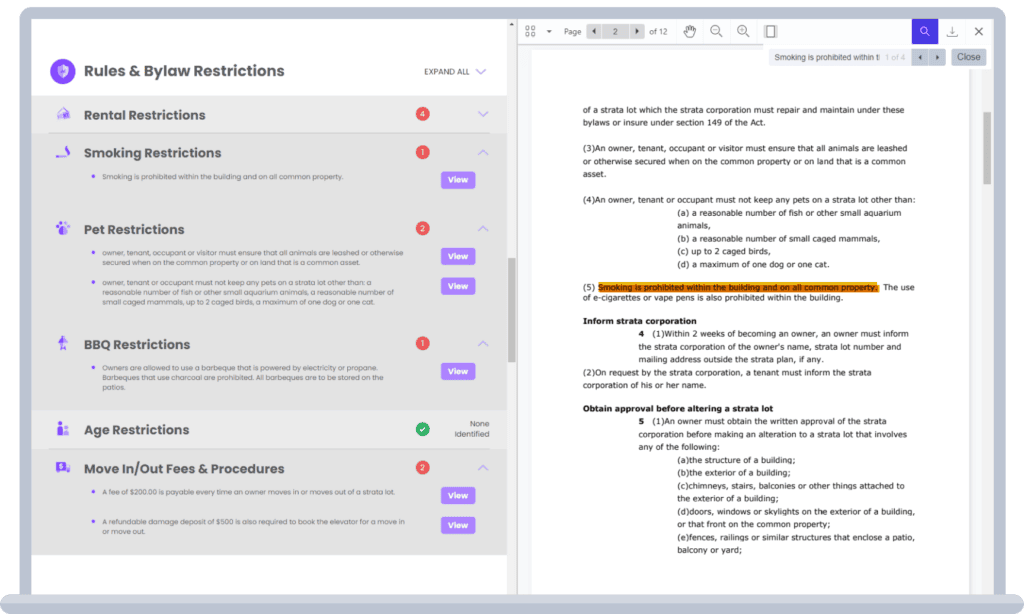As a realtor in Canada, understanding how to obtain and review condominium documents is crucial for ensuring that both buyers and sellers are well-informed about the property they are dealing with.
By the end of this article, you will have a comprehensive guide on how to get condo documents, the types of documents required for different property types, and the importance of reviewing these documents.
You’ll also learn about the new, more efficient ways to review condo documents, which can save time and reduce potential risks associated with condominium purchases.
Key Summary – How to Get Condo Documents
To get condo documents, you typically need to request them from the condominium corporation or management company, depending on whether it’s a new development or a resale property.
For new developments, developers are required to provide specific documents, while for resale properties, the condominium corporation must provide documents within a certain timeframe upon request.
Reviewing these documents is essential to assess the financial health and management practices of the condominium. And you can easily do that in minutes, not hours, with document review tools from Eli Report.
Getting Condo Documents for Various Property Types
New Developments
When dealing with new condominium developments, the process of obtaining documents is more structured. Developers are legally required to provide a comprehensive set of documents to potential buyers. These documents typically include:
- Statement of Occupancy Date: This outlines when the buyer can start occupying the unit.
- Budget and Financial Information: The corporation’s most recent budget or proposed budget.
- Occupancy Permit: Proof that the building is legally habitable.
- Floor Plan and Materials: Details on the unit’s layout and finishing materials.
- Fees and Charges: Information on any fees payable to the developer or third parties.
- Reserve Fund Report: A report detailing the funds set aside for future repairs and replacements.
For example, in Alberta, developers must also provide a summary of deficiencies, the date of original construction, and any major retrofits done to the building if it’s a conversion development.
Recommended Reading: Understanding Condo Reserve Funds in Canada
Re-Sale Properties
For resale properties, the process involves requesting documents from the condominium corporation.
While sellers are not obligated to provide these documents, the condominium corporation must respond to a written request within a specified timeframe, typically 10 days.
The documents may include:
- Condominium Plan and Additional Plan Sheets (CADS): These can be obtained from the Land Titles Office.
- Certificate of Title: Also available from the Land Titles Office.
- Financial Statements and Budget: Current financial health of the corporation.
- Bylaws and Rules: Governing documents for the condominium community.
For instance, in Ontario, condo corporations must maintain core and non-core records, which can be requested by owners or potential buyers.
The Types of Condo Documents You Need
The types of condo documents required for review can vary slightly by province but generally include:
- Financial Statements: Income statements and balance sheets to assess financial health.
- Bylaws and Rules: Regulations governing the condominium community.
- Meeting Minutes: Records of discussions and decisions made by the board.
- Reserve Fund Report: Details on funds set aside for future repairs.
- Insurance Certificates: Proof of insurance coverage for the property.
- Status Certificate: A comprehensive document detailing the condo corporation’s legal and financial status, often required by lenders.
In Alberta, documents like the Condominium Plan and CADS are crucial for understanding property boundaries and any changes to the bylaws.
In Ontario, the Condominium Authority of Ontario (CAO) provides guidelines on which records can be requested and how.
The Importance of Review Condo Documents
Reviewing condo documents is vital for several reasons:
- Avoiding Special Assessments: Understanding the reserve fund and any potential financial liabilities can help buyers avoid unexpected costs.
- Assessing Governance: Bylaws and meeting minutes reveal how the condominium is managed and any potential disputes.
- Identifying Structural Issues: Documents may highlight known structural deficiencies or needed repairs.
Traditionally, reviewing these documents has been a slow and time-consuming process, often requiring manual searches through extensive paperwork. However, this process is crucial for ensuring that buyers are fully informed about their investment.
The New Way to Review Condo Documents
In recent years, technology has transformed the way condo documents are reviewed. Automated document review services, like Eli Report, can instantly highlight key rules, restrictions, and building issues from condo documents, providing an interactive report.

This not only saves time but also reduces the risk of missing critical information. Additionally, hiring a real estate lawyer can provide added assurance by interpreting complex legal language and identifying potential risks.
For example, a professional review can cost around $400 but can save thousands of dollars by identifying potential issues early on. Automated services offer a cost-effective alternative, with some reports available for free or at a low cost.
Final Thoughts
In conclusion, obtaining and reviewing condo documents is a critical step in the condominium purchasing process.
Understanding the types of documents needed and how to access them efficiently can protect buyers from potential financial and legal pitfalls.
As technology continues to evolve, leveraging automated review services and legal expertise can streamline this process, ensuring a smoother and more informed transaction for both buyers and sellers.
